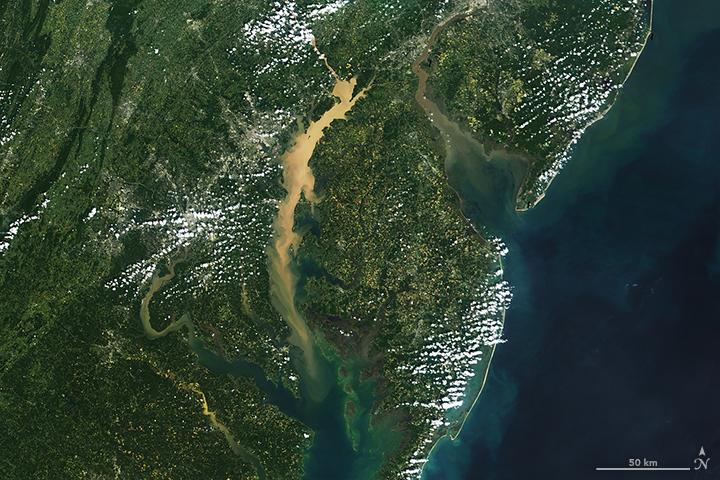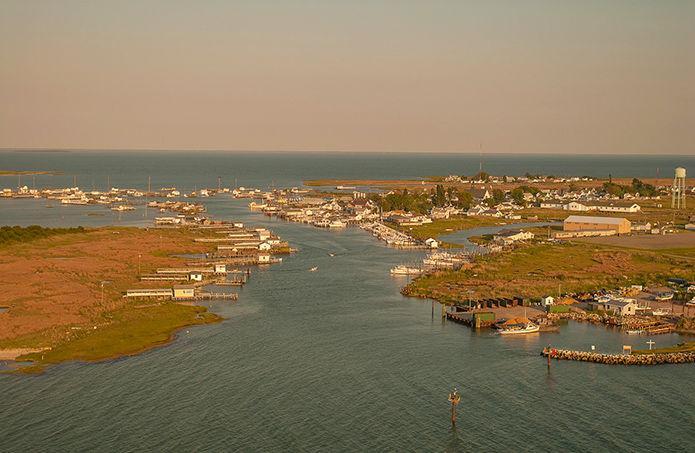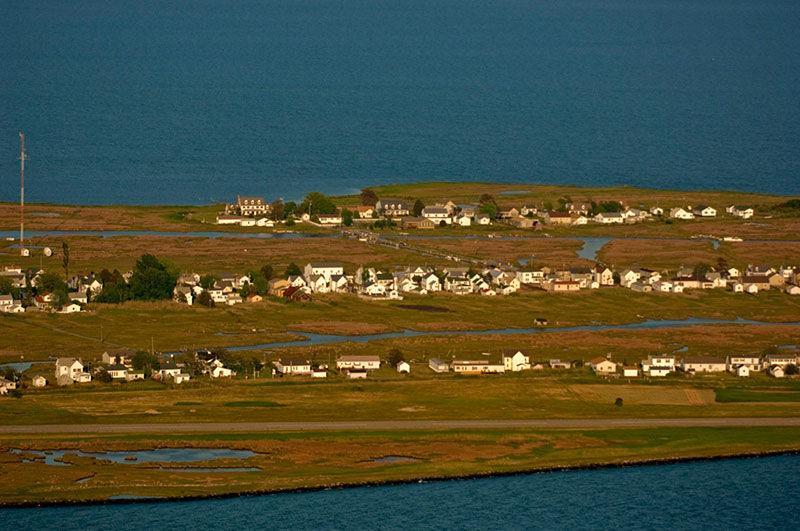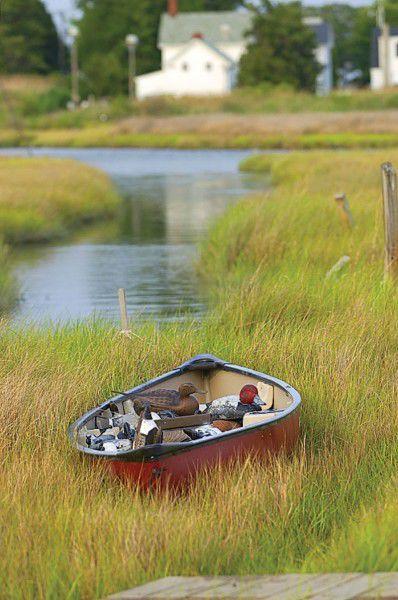As lawmakers in Chesapeake Bay watershed states convene in the new year, a variety of environmental issues are expected to come up for debate — some new, others revived from previous sessions. Here’s a legislative preview for 2022.
Maryland
Climate action, environmental justice and increased funding for Chesapeake Bay restoration efforts are among the top environmental issues facing lawmakers in their 2022 General Assembly session, which begins Jan. 12 and runs through April 11.
Environmental advocates are hoping that this year the third time really is the charm for climate legislation. Last year, the state House and Senate each passed bills to accelerate the state’s efforts to reduce greenhouse gas emissions, but legislators failed to iron out differences between the measures before the 90-day session ended.
This time, activists have joined forces to press for comprehensive climate action focused on renewable energy for electricity generation, transportation, and schools and other buildings. The proposed bills would commit the state to reducing greenhouse gas emissions 60% by 2030 — a 50% increase over the state’s current goal — and reaching carbon neutrality by 2045.
But the legislative package also aims to address the disproportionate impacts of air and water pollution on overburdened downwind and downstream communities, many of which have higher percentages of people of color.
“We have a tremendous opportunity this legislative session to be a leader, not only on climate, but also on making Maryland a leader on environmental justice,” said Staci Hartwell, environmental justice chair of the Maryland NAACP, in a December announcement of the coalition’s legislative platform.
In addition to providing new incentives and regulations to reduce fossil fuel use, advocates say their package would seek to address past and future inequities. It would include tax incentives, for instance, to increase access to solar energy and energy efficiency for low– and middle-income families and to prioritize equity in planning future transportation projects.
“We want to electrify buildings and cars, and we want to decarbonize the economy, and we believe we can do it without … burdening consumers,” said Del. Kumar Barve, chair of the House Environment and Transportation Committee. Advocates also hope to electrify the state’s school buses to spare children from harmful diesel exhaust as well as to fight climate change.
The climate-justice legislation could take different forms in House and Senate, but leaders say they’re committed to passing the overall agenda this year, given the United Nations’ latest scientific report warning that climate change is accelerating.
“We have no time to waste,” said Sen. Paul Pinsky, chair of the Education, Health and Environmental Affairs Committee.
There’s another reason to feel a sense of urgency. Fall elections will seat a new General Assembly in 2023, so any bills vetoed near the end of or after this 90-day session would have to be reintroduced and go through the legislative grinder all over again. Advocates are pressing lawmakers to act early enough to override possible vetoes by Gov. Larry Hogan.
With federal fiscal stimulus funding contributing to a record $2.5 billion state budget surplus, the Chesapeake Bay Foundation hopes to see more money spent on initiatives that can help restore the Bay while also easing the impacts of climate change.
The foundation intends to press for millions of dollars more for tree planting, urban agriculture and stormwater pollution controls. The group also wants lawmakers to beef up the state’s environmental enforcement by mandating more frequent inspections and stiffer penalties for pollution violations. There are more than 300 facilities statewide that are either out of compliance or operating on outdated discharge permits, according to Josh Kurtz, the foundation’s Maryland executive director.
This year will also see another attempt at amending the state constitution to enshrine Marylanders’ rights to clean air, water and soil. Though the environmental rights amendment has failed to get out of committee in three previous years, advocates believe they’re gaining ground in their push for Maryland to join Pennsylvania, New York and other states in making a healthy environment a fundamental human right.
Legislation aimed at protecting people from so-called “forever chemicals,” which failed last year, also will get another try. It would ban the use of intentionally added PFAS compounds in firefighting foam, food packaging, and rugs and carpets.
Virginia
Environmentalists find themselves on the defense after voters last November replaced outgoing Democratic Gov. Ralph Northam with a Republican, businessman Glenn Youngkin, and handed the GOP control of the state House of Delegates.
“I think people will be mentally preparing themselves to be taking a more defensive approach,” said Narissa Turner, the climate and clean energy policy manager at the Virginia Conservation Network. “We’re hoping to maintain the gains we’ve made over the last couple of sessions.”
After 2020 elections, Democrats held the reins of the state’s executive and legislative branches, the first time since 1993 that they had done so. On the environmental front, they used their advantage to cement the state’s membership in the Northeast’s carbon cap-and-trade program, ban Styrofoam food containers and set a 2050 deadline for the state’s two main electricity suppliers to be 100% carbon-free.
Now, Democrats cling to a 21–19 majority in the Senate as their only check on the new administration’s ambitions.
Youngkin’s actions as governor-elect — he takes office Jan. 15 — have all but confirmed environmentalists’ fears of rollbacks.
In December, Youngkin, a former CEO of a private-equity firm, announced plans to pull the state out of the cap-and-trade program through executive action. His transition office said that leaving the program, officially known as the Regional Greenhouse Gas Initiative, would save ratepayers $4.37 a month, or slightly more than $50 per year.
Youngkin, however, likely cannot make the move alone, at least not without a fight. Government experts say that the carbon targets are written into state code. To change them would require an unlikely about-face by Democrats in the Senate.
If Democrats hold firm, Youngkin might still be able to sever the state’s relationship with the RGGI. As governor, he will have authority over the Department of Environmental Quality, which oversees the RGGI auction program. His administration will have to find an alternative way to reduce pollution if the emission targets remain on the books.
The Air Control Board represents another hurdle for Youngkin. It has already enacted regulations setting the program in motion. He can appoint new members to the seven-member board but not until July, when two seats are up for grabs.
Youngkin drew considerable flak from environmentalists Jan. 5 when he nominated Andrew Wheeler as secretary of natural resources. Wheeler, a former coal lobbyist, was head of the Trump era Environmental Protection Agency, where he oversaw attempts to roll back federal air and water pollution regulations, including protections for wetlands and streams.
Michael Town, executive director of the Virginia League of Conservation Voters, called the pick unacceptable. “This is hands down the most extreme nomination for an environmental post in Virginia’s history and the absolute worst pick that the governor-elect could make,” he said in a statement.
Democrats hold confirmation power in the Senate, and several were quick to blast Youngkin’s selection.
“I know he’s new to Virginia government and all, but [Youngkin] does understand cabinet secretaries require General Assembly approval — right?” tweeted Sen. Scott Surovell, D-Fairfax. “Some GOP legislators should have problems with this unless they’re not interested in re-election?”
Environmentalists widely praised Northam’s final budget proposal, which outlines spending over the 2023 and 2024 fiscal years. Key outlays include:
- $100 million to Richmond, $40 million to Alexandria, and $25 million to Lynchburg to help upgrade their wastewater systems to prevent future overflows into nearby streams and rivers.
- $286 million to the Virginia Natural Resources Commitment Fund, ensuring full funding of the state’s program to improve stormwater controls on farms.
- $12 million to help tribal nations conserve and expand their lands, and $10 million to preserve historic sites related to Black and Indigenous Virginians.
Although Northam won’t be in office when the next budget is adopted, his proposal still matters, said Peggy Sanger, the Bay Foundation’s Virginia Executive Director. “It is certainly meaningful,” she added. “Like most bodies, you work from the document you’ve been given.”
The General Assembly convenes Jan. 12 and will run until March 12.
Pennsylvania
After a year in which only two minor environmental bills passed the General Assembly, 2022 has the potential to see several longstanding initiatives that benefit the Chesapeake Bay see the light of day.
For example, after 11 consecutive years bottled up in committees, a fertilizer bill has earned bipartisan support and buy-ins from commercial fertilizer manufacturers, nurseries and landscapers.
If passed, new regulations would limit the amount of fertilizer that can be applied on Pennsylvania’s estimated 2 million acres of turf grass. Commercial fertilizer placed on lawns would have to follow certain rates by licensed applicators, and enforcement processes would be set up. Labeling on fertilizer bags sold in stores would warn against overapplication, and a public education program would be funded.
One sticking point — that EPA give Pennsylvania credit for nutrient reductions resulting from the tighter controls — has been worked out.
“The language is there for this to be meaningful,” said Marel King, the Chesapeake Bay Commission’s Pennsylvania director.
Another bill that has bipartisan support is a Community Solar Bill that would allow state residents, farmers and businesses to invest in local, small-scale solar projects and earn credits on their electric bills.
Less certain are several initiatives that would significantly increase funding for agriculture conservation practices that would help improve water quality locally and in the Chesapeake Bay.
One bill would allocate $500 million from the state’s federal American Rescue Plan for farm conservation, mine reclamation, open space and recreation projects. Another would collect fees from the largest commercial users of water to raise $350 million a year, which would help fund farm conservation measures and water restoration projects.
Another new funding source would come from a bipartisan bill to create an Agricultural Conservation Assistance Program.
Several bills aim to mandate an increase in the amount of electricity generated in the state by renewable energy.
The Republican-controlled legislature also hopes to undo Governor Tom Wolf’s executive order to have Pennsylvania join the Regional Greenhouse Gas Initiative, which would impose fees on utilities, on the state’s behalf, if they fail to meet goals for reducing power plant emissions.



















